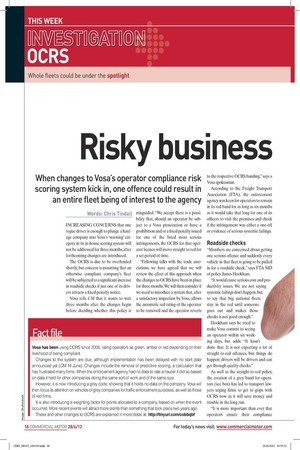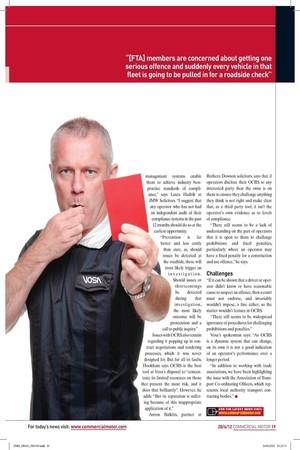Risky business
Page 12

Page 13

If you've noticed an error in this article please click here to report it so we can fix it.
When changes to Vosa’s operator compliance risk scoring system kick in, one offence could result in an entire fleet being of interest to the agency
Words: Chris Tindall
INCREASING CONCERNS that one rogue driver is enough to plunge a haulage company into Vosa’s ‘warning’ category in its in-house scoring system will not be addressed for three months, after forthcoming changes are introduced.
The OCRS is due to be overhauled shortly, but concern is mounting that an otherwise compliant company’s fleet will be subjected to a significant increase in roadside checks if just one of its drivers attracts a fixed penalty notice.
Vosa tells CM that it wants to wait three months after the changes begin before deciding whether this policy is misguided. “We accept there is a possibility that, should an operator be subject to a Vosa prosecution or have a prohibition and or a fixed penalty issued for one of the listed most serious infringements, the OCRS for that operator licence will move straight to red for a set period of time.
“Following talks with the trade associations, we have agreed that we will review the effect of this approach when the changes to OCRS have been in place for three months. We will then consider if we need to introduce a system that, after a satisfactory inspection by Vosa, allows the automatic red rating of the operator to be removed and the operator reverts to the respective OCRS banding,” says a Vosa spokesman.
According to the Freight Transport Association (FTA), the enforcement agency was keen for operators to remain in its red band for as long as six months as it would take that long for one of its officers to visit the premises and check if the infringement was either a one-off or evidence of serious systemic failings.
Roadside checks
“Members are concerned about getting one serious offence and suddenly every vehicle in that fleet is going to be pulled in for a roadside check,” says FTA MD of policy James Hookham.
“It would cause serious cost and productivity issues. We are not saying systemic failings don’t happen, but to say that big, national fleets stay in the red until someone goes out and makes those checks is not good enough.” Hookham says he tried to make Vosa commit to seeing an operator within six working days, but adds: “It hasn’t done that. It is not expecting a lot of straight-to-red offences, but things do happen; drivers will be drivers and can get through quality checks.” As well as the straight-to-red policy, the creation of a grey band for operators (see box) has led to transport lawyers urging firms to get to grips with OCRS now as it will save money and trouble in the long run.
“It is more important than ever that operators ensure their compliance management systems enable them to achieve industry bestpractice standards of compliance,” says Laura Hadzik at JMW Solicitors. “I suggest that any operator who has not had an independent audit of their compliance systems in the past 12 months should do so at the earliest opportunity. “Prevention is far better and less costly than cure, as, should issues be detected at the roadside, these will most likely trigger an investigation. Should issues or shortcomings be detected during that investigation, the most likely outcome will be prosecution and a call to public inquiry.” Issues with OCRS also remain regarding it popping up in contract negotiations and tendering processes, which it was never designed for. But for all its faults, Hookham says OCRS is the best tool at Vosa’s disposal to “concentrate its limited resources on those that present the most risk, and it does that brilliantly”. However, he adds: “But its reputation is suffering because of this inappropriate application of it.” Anton Balkitis, partner at Rothera Dowson solicitors, says that if operators disclose their OCRS to any interested party then the onus is on them to ensure they challenge anything they think is not right and make clear that, as a third party tool, it isn’t the operator’s own evidence as to levels of compliance.
“There still seems to be a lack of understanding on the part of operators that it is open to them to challenge prohibitions and fixed penalties, particularly where an operator may have a fixed penalty for a construction and use offence,” he says.
Challenges
“If it can be shown that a driver or operator didn’t know or have reasonable cause to suspect an offence, then a court must not endorse, and invariably wouldn’t impose, a fine either, so the matter wouldn’t feature in OCRS.
“There still seems to be widespread ignorance of procedures for challenging prohibitions and penalties.” Vosa’s spokesman says: “As OCRS is a dynamic system that can change, on its own it is not a good indication of an operator’s performance over a longer period.
“In addition to working with trade associations, we have been highlighting the issue with the Association of Transport Co-ordinating Officers, which represents local authority transport contracting bodies.” ■










































